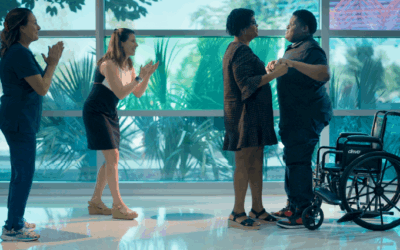Consider it like a jar up on the shelf. It’s filled with all your important handwritten notes and instructions and thoughts. You’ve stored it away for later, for when the time comes that your family and loved ones might have to make incredibly tough decisions about your care.
They’ll pull the jar from the shelf, dust it off and open it up, sorting through the roadmap you’ve left behind instructing them on your end-of-life wishes.
That’s how Mary Coenen Raven, MD, and Mark Lewis Kantrow, MD, hospice and palliative care physicians with Our Lady of the Lake Physician Group Palliative and Supportive Care, view the process of creating a living will and establishing a Healthcare Power of Attorney.
April 16 is National Healthcare Decisions Day, and every adult patient—not just those who are older or facing a serious illness—are encouraged to document and define their wishes regarding healthcare during a life-threatening illness or during end-of-life care.
“If you don’t complete something like this and if you don’t have conversations ahead of time, you are putting your family in a situation to make really difficult decisions in an emotional time,” Dr. Raven says. “I think about this as just part of being a responsible adult, part of getting your affairs in order. It’s just as important as life insurance.”
Franciscan Missionaries of Our Lady Health System created the Advance Care Planning guide to walk you through this important and sensitive process, outlining the steps you can take to set up a living will and identify the appropriate person to serve as your Healthcare Power of Attorney.
Included in the guide are important terms you need to know as well as the physical forms you can fill out and use as official documents to signify your end-of-life wishes.
Check out this video where Dr. Raven and Dr. Kantrow discuss the guide, and read on for six steps on planning for the future.
1. Identify your Medical Decision Maker, also known as Healthcare Power of Attorney.
This person would make decisions for you if you were unable due to illness or injury. Those decisions might include resuscitation, being placed on a breathing machine, surgery or stopping any treatments if they are no longer deemed helpful.
Dr. Raven and Dr. Kantrow suggest selecting someone who is decisive, who can listen and take in complex medical information, and can confidently stand up for your wishes. Most importantly, this should be someone who knows you and understands your views, values and wishes.
This could be a family member, friend or a partner. State law in Louisiana employs a specific process of selecting this person if you have not named a Healthcare Power of Attorney.
2. Think about your own values and beliefs and determine what quality of life is important to you.
What does a living will mean to you? Do you think certain treatments or medical situations might be overly burdensome? There are no wrong answers here.
3. Based on this, document your wishes in an Advanced Directive/Living Will Declaration.
With a living will, you can state how you’d like medical professionals to proceed with the use of life-sustaining procedures, or whether you want to receive “artificial” nutrition through an IV or tube if it’s clear those actions might only prolong the dying process.
4. Think about and document any additional wishes.
Speak to your healthcare provider about end-of-life care and consider any questions that might come up beyond that, such as funeral services, what will happen to your body after you die and organ donation.
5. Discuss your decisions with your Medical Decision Maker/Healthcare Power of Attorney, loved ones and healthcare providers.
Make sure your instructions are clearly understood and that your loved ones and family members know who your Healthcare Power of Attorney will be during that process.
6. Make your documents legal.
Fill out the forms at the back of the Advance Care Planning guide, which are attached with perforated edges so you can easily remove them from the booklet. Attach supplemental pages if you want to include additional instructions. You can upload your forms to MyChart to be included in your electronic medical record or bring them with you to your primary care physician’s clinic or to the hospital to be scanned into your electronic medical record.
For Louisiana patients, have them signed by two witnesses—space for signatures is included on the forms.
An important note: Louisiana law does not require notarization on a living will declaration. For Mississippi residents, please refer to the law referenced in St. Dominic’s Advance Directive.
Dr. Kantrow stresses that transparency is important in this process to help ease the stress on family members and loved ones. They might already be suffering through strong emotions, confusion and other burdens while deciding on the next steps to take around your end-of-life care.
“It’s good to use the Advance Care Planning guide to talk a little bit about what kind of person you are, what your values are, what’s important to you, how you want the end of your life to be,” Dr. Kantrow says. “Although this is not a physician’s order, it is simply an advanced directive. If you come to the hospital and this is shown to the physician team, it provides a point to start talking about what kind of care is best for you because you can’t anticipate every possible medical situation.”




